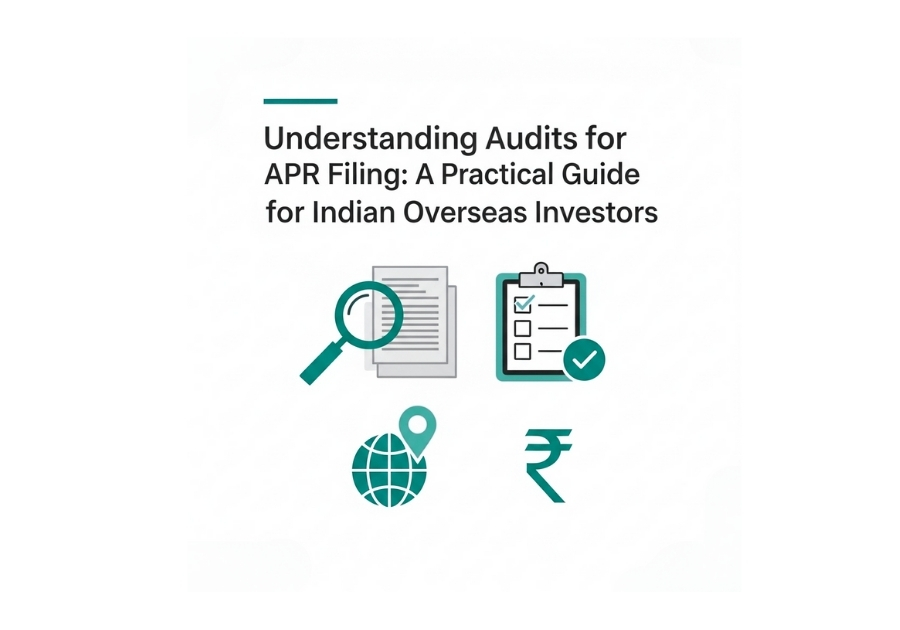If you’ve made overseas investments as an Indian entity whether it’s a wholly-owned subsidiary in Singapore, a joint venture in the UAE, or a holding company in the United States you’re likely aware of a regulatory obligation known as the Annual Performance Report (APR). Filed under the Foreign Exchange Management Act (FEMA), this report plays a crucial role in the RBI’s monitoring of outbound investments. However, what’s often misunderstood or underestimated is the audit component of this report. And more importantly, the consequences of getting it wrong or worse, ignoring it altogether. Let’s demystify what the APR is, why the audit requirement matters, and how Indian investors can navigate it confidently, without last-minute stress
APR in Simple Terms: What’s It All About?
Think of the APR as a yearly financial health certificate of your foreign investment. It needs to be submitted to your Authorized Dealer (AD) Bank, essentially your RBIlicensed bank that manages forex compliance by December 31st of each year. It captures a snapshot of your overseas entity’s performance: assets, liabilities, profits, losses, and any changes in shareholding or repatriation of funds to India. But here’s what many entrepreneurs and CFOs overlook: an APR is not just a formfilling exercise. It’s a regulatory audit trail. And the RBI doesn’t take non-compliance lightly.
Why Does the Audit Matters More Than You Think?
\ Here’s where the confusion usually begins. As per revised FEMA guidelines, if you have “control” over the foreign entity, that is, if you own the majority shares or have the power to appoint directors you’re expected to submit an audited financial statement of that overseas entity along with your APR.
This isn’t just red tape. An audit is a formal, professional confirmation that the numbers you’re reporting are legitimate, verified, and free from material errors. It adds a layer of accountability
not just to your APR, but also to your cross-border credibility. Even if your host country doesn’t mandate an audit, the RBI expects Indian stakeholders to follow a higher standard if control is held. That means arranging a third-party audit in that foreign jurisdiction or alternatively, having a chartered accountant in India certify those foreign financials, in certain qualifying scenarios.
And here’s the tricky part: this has to be sorted before December 31st. Waiting until Q4 will almost certainly lead to frantic coordination across time zones, late-night document chasing, and potential compliance lapses.
RBI’s Intent Behind the Audit Requirement
The Reserve Bank of India’s intent is not to burden businesses with paperwork. Rather, it’s to create a reliable mechanism to monitor India’s outward foreign investments. In a world where global compliance risks can lead to blacklisting or fund loss, the APR provides RBI and other regulatory bodies with data points that enable proactive intervention, if needed.
Having audited or certified financials gives regulators confidence that outbound flows are being used for genuine business activity and not for tax evasion, money laundering, or other high-risk exposures.
Procrastination Comes at a Cost
Many companies miss their APR deadline simply because the foreign audit was not initiated in time. In some cases, they assume they’re exempt only to learn late in the process that they actually qualify under the “control” definition.
Non-filing or incorrect filing can result in compounding penalties under FEMA, delayed future investments, and loss of reputation with the AD Bank or RBI. Worse, it can attract scrutiny that impacts unrelated business transactions.
Let Boutique Compliance Experts Do the Heavy Lifting
The Good News? You don’t have to navigate this alone. Boutique compliance firms like Connect Ventures specialize in precisely this type of cross-border complexity. Whether your company is registered in the U.S., Canada, Singapore, the UK, or Dubai, we can help arrange foreign audits, validate financials, and file your APR correctly well ahead of the deadline.
Unlike large audit firms that treat this as a minor filing task, we understand the strategic importance of accurate reporting. Our team is well-versed in host-country compliance, and we work with RBI-compliant Indian professionals to close the loop at home. It’s not just paperwork; it’s strategic governance
Don’t Wait Until December!
If you’ve invested overseas or plan to do so, treat the APR as a year-long responsibility, not a year-end obligation. Start by gathering your financials, identifying audit obligations based on your shareholding/control, and engaging a professional to guide you through the nuances.
The earlier you begin, the smoother the process. And with the right partner by your side, compliance becomes a value-driver not a pain point.
Need Help With APR Filing or Foreign Entity Audits?
Connect Ventures can help you prepare and file APRs, arrange foreign audits, and manage FEMA compliance no matter where your business is incorporated globally. Talk to our cross-border experts today.


